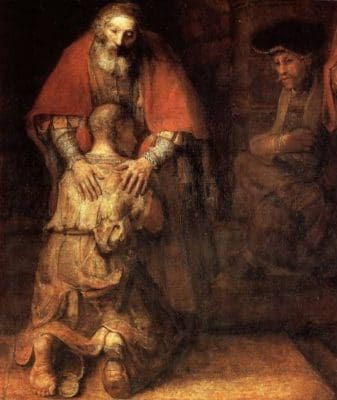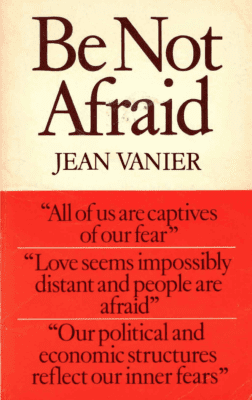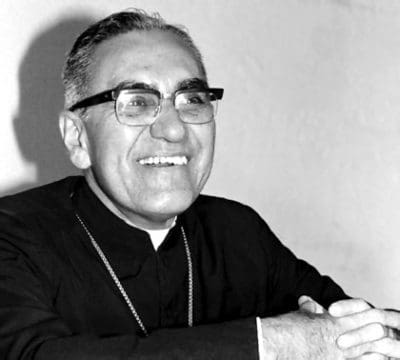by Clint Baldwin, Executive Director
This last weekend, my pastor offered a sermon on a topic that has been near to my heart for a long time and has also been part of Word Made Flesh discussions for a long time, too. He spoke about the parable of the Prodigal Son and throughout referenced Henri Nouwen’s classic text that explores Rembrandt’s painting related to the parable.
In connection with this parable, I’ve been pondering again the vital and wonderful Upside-Down Kingdom, Gospel idea that none of us are the heroes or heroines of our story. Our Lord takes this role. The root of anything truly/authentically/genuinely good, heroic, beautiful, etc. about us is derived/bestowed/gifted; it is not original to us. That is, we were made/created to be able to manifest such qualities, but as much as we might like to believe in our own capabilities these qualities are not self-engendered.

“Return of the Prodigal Son” by Rembrandt
The scriptures remind us that our salvation, our righteousness, our belonging, our belovedness and the like come by grace. Such characteristics are gifted by God. They are not produced by us (as per Romans, we learn that none are righteous of their own making). A status of goodness cannot be achieved by our efforts; this alleviates both the possibility of boasting and the need for shame. The book of Isaiah reminds us that to God our righteousness is as rags. Paul the apostle in the book of Philippians shares that he considers even the best of his striving to be rubbish.
Recognition of our limitations and inabilities is not at all meant to bring us shame. Rather, the Lord means us to be free of the burden of the shackles of performance. Our worth is ultimately not based upon any form of imaginable self-(fill-in-the-blank). Instead, our worth is based on the fact that we are Loved by the One who made and sustains us. This applies to everyone, everywhere, always. This reality is one of the major messages of the parable of the prodigal son. While our unhealthy actions will at times set certain negative consequences in motion, above, beyond, and deeper, is Love that remains welcoming of us.
This is the message of Joy and Freedom that we seek to share everywhere we go with everyone that we meet. From the foundation of the world, before anyone anywhere could do anything about it, pervasive, unquenchable Love permeated every single aspect of existence at its core. Anything not fully expressing Love is a deviation from the ultimate norm that governs the universe.
Understanding that we will not ever be the ultimate heroines/heroes of our story fosters a healthy sense of Humility that assists us in guarding against an aggrandizing pride that is harmful to self and others. It allows us to simultaneously have Grace for others and for ourselves.
Having done harm and having experienced hardship, the Prodigal Son comes back to the Father. The Father with open arms welcomes and celebrates this choice of return. The son remained loved by the Father while leaving and while far off, but through all kinds of misunderstanding the son’s comprehension of his inestimable and intrinsic value was obscured. False ideas that we hold about ourselves sometimes keep us from God, but they do not keep God from us. As false ideas are erased, our need for God becomes apparent – as it became apparent to the Prodigal Son that his place was in his Father’s home. As false ideas are erased, our propensity toward unhealthy action dissipates, and we find ourselves leaning into and held in God’s awaiting embrace. These arms sustain us even when we are not pursuing being embraced, but there is a profound sweetness in reciprocated relationality. It is a beautiful thing when we find ourselves in the Embrace of God that at every moment awaits our return to consciously accepting its Presence.

Considering the topic, I am reminded of a chapter titled “Jesus the Healer” by Jean Vanier in his book, Be Not Afraid. The chapter well showcases both our need for the Savior and His love for us. If you have time, I highly encourage you to read it.
In closing, I leave you with the prayer that has been called “The Romero Prayer” after Oscar Romero. However, the prayer was actually written by another. I know that many of you have come to love this prayer. I offer it here because the whole prayer is wonderful and it poignantly fits this reflection. I particularly appreciate the succinct reminder that, “We are workers, not master builders; ministers, not messiahs.” That is, it’s not principally who we are, but Whose we are.

Oscar Romero
So, friends, grace to you today. May you continue in your work and ministry recognizing that you are Loved by your Creator and Sustainer. In such recognition of God’s Love for you, may you continue to offer to others paths into understanding the availability of God’s unfailing Love for them too.
May God who is the Hero of each of our stories, guide us as we seek to learn to be His disciples, friends, and children.
It helps, now and then, to step back and take a long view.
The kingdom is not only beyond our efforts, it is even beyond our vision.
We accomplish in our lifetime only a tiny fraction of the magnificent
enterprise that is God’s work. Nothing we do is complete, which is a way of
saying that the Kingdom always lies beyond us.No statement says all that could be said.
No prayer fully expresses our faith.
No confession brings perfection.
No pastoral visit brings wholeness.
No program accomplishes the Church’s mission.
No set of goals and objectives includes everything.
This is what we are about.
We plant the seeds that one day will grow.
We water seeds already planted, knowing that they hold future promise.
We lay foundations that will need further development.
We provide yeast that produces far beyond our capabilities.
We cannot do everything, and there is a sense of liberation in realizing that.
This enables us to do something, and to do it very well.
It may be incomplete, but it is a beginning, a step along the way, an
opportunity for the Lord’s grace to enter and do the rest.We may never see the end results, but that is the difference between the master
builder and the worker.We are workers, not master builders; ministers, not messiahs.
We are prophets of a future not our own.
__________________
This prayer was first presented by Cardinal Dearden in 1979 and quoted by Pope Francis in 2015. This reflection is an excerpt from a homily written for Cardinal Dearden by then-Fr. Ken Untener on the occasion of the Mass for Deceased Priests, October 25, 1979. Pope Francis quoted Cardinal Dearden in his remarks to the Roman Curia on December 21, 2015. Fr. Untener was named bishop of Saginaw, Michigan, in 1980.
(via http://www.usccb.org/prayer-and-worship/prayers-and-devotions/prayers/prophets-of-a-future-not-our-own.cfm)
